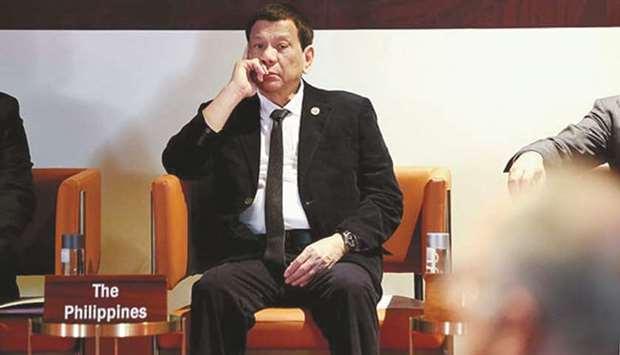President Rodrigo Duterte has called on nations to desist “adventurism” in South China Sea, as he reaffirmed the importance of peace and stability in the disputed sea, Malacanang said a day before Chinese President Xi Jinping’s state visit.
Duterte made the call during the recently concluded 33rd Association of Southeast Asian Nations (Asean) Summit and Related Summits in Singapore, where he urged his fellow Southeast Asian leaders and their dialogue partners to refrain from carrying out acts that may further escalate tensions in the disputed sea.
“In his national statement, the president reaffirmed the need to maintain and promote peace, stability, security, safety and freedom of navigation and overflight in the South China Sea and stressed the need to exercise self-restraint and avoid actions that may further complicate the situation,” Malaca?ang said in a statement.
“The president asserted that aggressive moves by nations can worsen the situation with damage that could be exponential. The president urged stakeholders to desist from adventurism in the South China Sea,” it added. The Philippines is the country co-ordinator for the Asean-China dialogue.
Manila, one of claimants to a number of features in the disputed waters which it calls the West Philippine Sea, scored a victory against China in 2016 before a United Nations-backed tribunal that invalidated Beijing’s “nine-dash line” claim to the vital sea lane. Under Duterte’s leadership, however, the Philippines has refused to flaunt the victory and antagonise China, in exchange for better economic ties with the world’s second largest economy.
Duterte, as country co-ordinator for Asean-China dialogue relations, maintained that a code of conduct (CoC) in the South China Sea should be implemented at the soonest time possible.
“He (Duterte) reaffirmed Asean and China’s shared commitment to the full and effective implementation of the Declaration on the Conduct of Parties in the South China Sea,” the Palace said.
“While noting the steady progress in the negotiations on a code of conduct in the South China Sea, President Duterte called on all parties to work together for the early conclusion of an effective and substantive CoC,” it added.
In an op-ed piece published in Philippine newspapers ahead of his two-day state visit, President Xi said Manila and Beijing should “make the South China Sea a sea of peace, friendship and co-operation.”
“We need to deepen political mutual trust to sustain the growth of China-Philippine relations. China wishes to work with the Philippines to draw up blueprints for our future relations with a broader perspective, and strengthen strategic communication on bilateral ties and major regional and international issues. We need to properly handle differences through friendly consultations, enhance dialogue and co-operation on maritime issues, and make the South China Sea a sea of peace, friendship and co-operation that truly benefits our two peoples,” Xi said.
The Chinese leader noted that “Since President Duterte took office, China and the Philippines have re-engaged in dialogue and consultation for the proper handling of the South China Sea issue.”
“Our relations have now seen a rainbow after the rain. In just a little more than two years, China has become the Philippines’ largest trading partner, largest export market and largest source of imports, and the second largest source of tourists. There has been a surge of interest for private investment in each other’s countries, and interactions between our cultural groups have been frequent,” he said.
“More and more Philippine fruits are coming to the dining table in Chinese households, and a growing number of Philippine scenic spots are being included in the itinerary of Chinese tourists. China firmly supports the Philippines’ fight against drugs and terrorism and its post-conflict reconstruction efforts in Marawi, thus contributing to peace in the country. In the face of disasters, our two peoples have stood together and come to each other’s help, writing new chapters of friendship between our two countries,” he added.
Malacanang noted that during the Asean meetings, “the Philippines clearly articulated its principled position on the need for a rules-based order in the region while underscoring the imperative for security and stability as necessary conditions for sustained growth and development.”
It said the president emphasised the need to sustain Asean efforts toward building a “resilient and innovative” region, while underscoring the need for developing relations with dialogue partners based on “mutual respect for sovereignty.”

Duterte: wants nations to end adventurism
